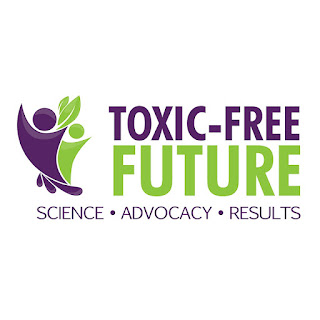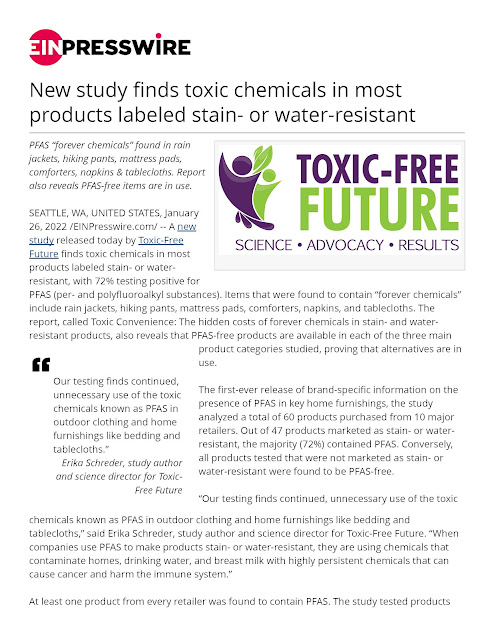PFAS “forever chemicals” found in rain jackets, hiking pants, mattress pads, comforters, napkins & tablecloths. Report also reveals PFAS-free items are in use.
"Our testing finds continued, unnecessary use of the toxic chemicals known as PFAS in outdoor clothing and home furnishings like bedding and tablecloths." Erika Schreder, study author and science director for Toxic-Free Future
“Rain jackets shouldn't cause cancer—but for some of us, that just might be the case,” said Emily Donovan, co-founder of Clean Cape Fear. “These companies sold a convenience product to consumers without fully disclosing the toxic trade-off. In my region of North Carolina, our drinking water has been severely contaminated from the manufacture of PFAS chemicals. No one's drinking water should be contaminated for a rain jacket.”
The study also reveals that manufacturers have been using a mixture of PFAS, including compounds currently banned in other countries. Testing found both older PFAS, already banned in the European Union and phased out by major U.S. manufacturers, as well as newer PFAS. Although the newer PFAS compounds are commonly believed to be the most in use, 74% of items with PFAS tested positive for the older PFAS.
“PFAS contamination of the Arctic poses a particular threat to the health of Indigenous peoples who are reliant on traditional foods as essential to their physical, spiritual, and cultural sustenance,” said Pamela Miller, executive director of Alaska Community Action on Toxics and co-chair of the International Pollutants Elimination Network (IPEN). “It is time to stop this terrible injustice, hold manufacturers accountable, and urgently establish national and international bans for the entire class of PFAS.”
The study found items in each category that were marketed as stain- and/or water-resistant yet appeared to be free of PFAS. “Some companies are using PFAS-free alternatives, but until regulations ban PFAS in products, these dangerous chemicals will continue to be used in our raincoats and bedding,” said Laurie Valeriano, executive director of Toxic-Free Future. "We need urgent action at the state and federal levels to solve the PFAS crisis, including by quickly stopping its use in products we wear and use in our homes.” The report also provides recommendations on what consumers can do and how manufacturers, retailers, and state and federal leaders can act to bring a swift end to the use of toxic “forever chemicals.”
The study comes during a national campaign calling on REI and other retailers to ban PFAS in outdoor apparel and other textiles. Since November 2021, more than 60,000 REI customers have signed petitions and sent e-mails to the REI CEO and Board calling for action on PFAS. In December, a group of more than 100 local, state, and national organizations sent a letter to REI calling on the company to lead the outdoor apparel industry in a bold transition away from the entire class of PFAS.









No comments:
Post a Comment